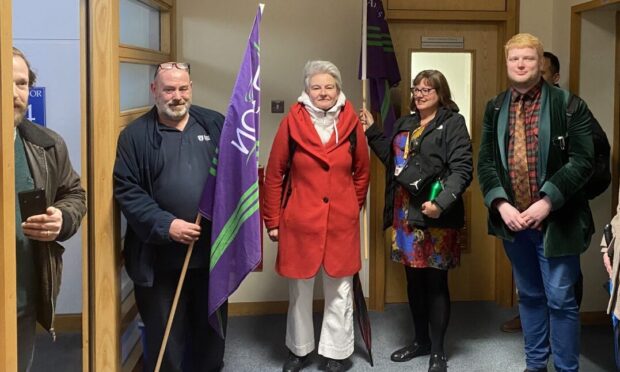Hundreds of tenants have been evicted from council homes in Dundee after struggling to keep up with rent payments.
A freedom of information request to the city council revealed a total of 436 households were evicted between April 2010 and December 2017.
The average number of households evicted each year in that time is 50, with the highest number coming in 2015/16, when 69 were ordered to leave their homes.
Dundee City Council said it focuses much of its work on prevention of homelessness and is “sympathetic” to those facing eviction.
Graeme Brown, director of Shelter Scotland, said evictions are “very costly” and “resolve nothing”.
He said: “While it is a tenant’s responsibility to make every effort to pay their rent, councils too must do all they can to help people who are struggling.
“They should only ever use eviction as a last resort.
“Eviction in many cases leads to homelessness and the council then has the responsibility to re-house families and individuals. This is very costly to the public purse and resolves nothing. More must be done to help people stay in their homes rather than evicting them.”
He added the increasing cost of bills and rent, as well as the roll-out of the UK Government’s new Universal Credit system has led to so-called housing related poverty.
He said: “Housing related poverty – where those on the lowest incomes are spending an increasingly higher percentage of their earnings on housing costs like rent and utility bills – is making it even more difficult for people to make ends meet and keep a roof over their heads.
“Universal credit has had an impact on people’s ability to pay rent – especially the 6-week delay in receiving payments such as housing benefit. Thankfully this wait-time is being reduced.”
A Dundee City Council spokesperson said: “We provide a one-door advice, information and accommodation service for people who are homeless or threatened with homelessness.
“We understand that being homeless or being in danger of losing a home is difficult and traumatic and our aim is to offer a service that is sympathetic to the situation as well as meeting our statutory duties.
“When we are contacted the first thing that happens is an assessment interview within three working days, or if a person is ‘roofless’ they will be seen on the same day.
“Homeless officers will:
- Provide free, confidential, information and advice on all aspects of homelessness;
- Provide a range of housing options;
- Provide benefit advice to maximise income;
- Where possible, help to prevent homelessness;
- Give support and guidance to find solutions to the housing problems;
- Arrange referrals to other housing providers and support agencies; and
- Provide temporary accommodation.
“We do not use bed and breakfast establishments for temporary accommodation and work with people to provide more permanent tenancies with the council, other registered social landlords or private sector providers.
“More information is available on the council’s website at www.dundeecity.gov.uk/housingoptions/hohomeless/.”










